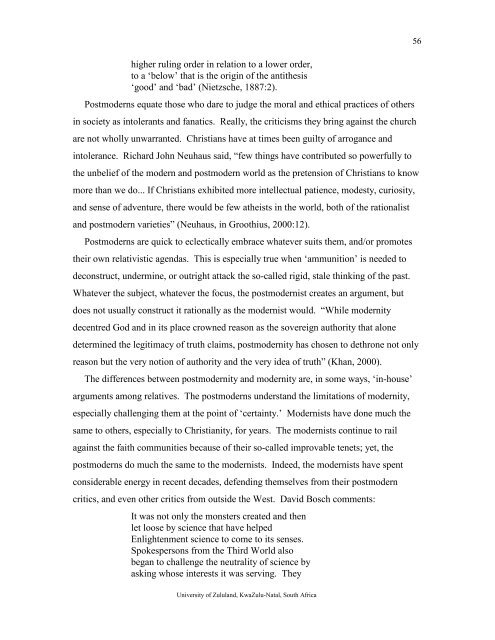Haase_UZ_x007E_DTh (2).pdf - South African Theological Seminary
Haase_UZ_x007E_DTh (2).pdf - South African Theological Seminary
Haase_UZ_x007E_DTh (2).pdf - South African Theological Seminary
Create successful ePaper yourself
Turn your PDF publications into a flip-book with our unique Google optimized e-Paper software.
higher ruling order in relation to a lower order,<br />
to a ‘below’ that is the origin of the antithesis<br />
‘good’ and ‘bad’ (Nietzsche, 1887:2).<br />
Postmoderns equate those who dare to judge the moral and ethical practices of others<br />
in society as intolerants and fanatics. Really, the criticisms they bring against the church<br />
are not wholly unwarranted. Christians have at times been guilty of arrogance and<br />
intolerance. Richard John Neuhaus said, “few things have contributed so powerfully to<br />
the unbelief of the modern and postmodern world as the pretension of Christians to know<br />
more than we do... If Christians exhibited more intellectual patience, modesty, curiosity,<br />
and sense of adventure, there would be few atheists in the world, both of the rationalist<br />
and postmodern varieties” (Neuhaus, in Groothius, 2000:12).<br />
Postmoderns are quick to eclectically embrace whatever suits them, and/or promotes<br />
their own relativistic agendas. This is especially true when ‘ammunition’ is needed to<br />
deconstruct, undermine, or outright attack the so-called rigid, stale thinking of the past.<br />
Whatever the subject, whatever the focus, the postmodernist creates an argument, but<br />
does not usually construct it rationally as the modernist would. “While modernity<br />
decentred God and in its place crowned reason as the sovereign authority that alone<br />
determined the legitimacy of truth claims, postmodernity has chosen to dethrone not only<br />
reason but the very notion of authority and the very idea of truth” (Khan, 2000).<br />
The differences between postmodernity and modernity are, in some ways, ‘in-house’<br />
arguments among relatives. The postmoderns understand the limitations of modernity,<br />
especially challenging them at the point of ‘certainty.’ Modernists have done much the<br />
same to others, especially to Christianity, for years. The modernists continue to rail<br />
against the faith communities because of their so-called improvable tenets; yet, the<br />
postmoderns do much the same to the modernists. Indeed, the modernists have spent<br />
considerable energy in recent decades, defending themselves from their postmodern<br />
critics, and even other critics from outside the West. David Bosch comments:<br />
It was not only the monsters created and then<br />
let loose by science that have helped<br />
Enlightenment science to come to its senses.<br />
Spokespersons from the Third World also<br />
began to challenge the neutrality of science by<br />
asking whose interests it was serving. They<br />
56<br />
University of Zululand, KwaZulu-Natal, <strong>South</strong> Africa

















